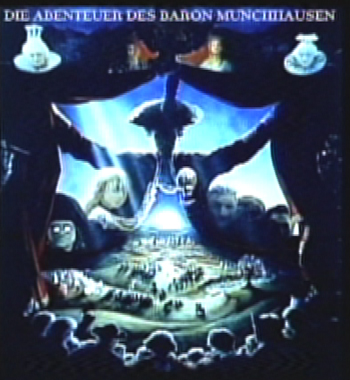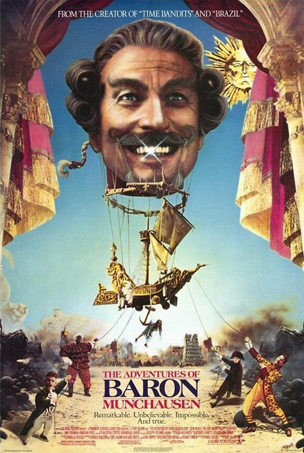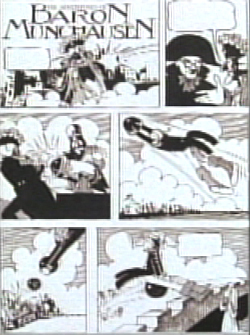THE TERRY GILLIAM FILES // "MUNCHAUSEN" (1989) |
MUNCHAUSEN Publicity |  |
|
There was never any question that MUNCHAUSEN would be given a specialized, platform release — opening in a few markets to attract notices and word-of-mouth, and gradually expanding into smaller, more rural markets. By comparison, a major studio release with a major box office star, in the late 1980s, might open on 2,000 screens.
(Left: An educational booklet teaching students about an amazing man who lies, steals from a sultan and kisses other men's wives.) Although Columbia had no other picture to open over the holidays, the decision was made by the studio that, in order to promote the picture, it would have to be sold slowly, building to a release in Spring 1989, in order to give the studio's marketing department more time to familiarize moviegoers with who the Baron was. In the press, the stated reason was that the film was not ready for delivery, due to the complicated effects work. Regardless of this, the film was opened by its German distributor, Neue Constantin, in early December. Columbia's strategy was to promote the Baron is different stages over the holidays, initiating over Christmas, and then building towards Easter. Ad concepts were submitted to Columbia by various agencies. (Most were never approved or fully realized.) They followed the basic precept that, prior to the film's opening, a long campaign would be started to familiarize America with Baron Munchausen. One suggested course for the first wave of advertising was a campaign featuring real people — some of them celebrities, such as Sting or Magic Johnson — who would enthusiastically proclaim, "I believe the BARON!" This would naturally fuel curiosity: "Who is the BARON?" This teaser would be extended further: "Do YOU believe the BARON?" This concept went rather far in the development stage, and was even proposed to appear on bumper stickers ("Honk if you believe the BARON!") before being dropped. Evidently some consideration was finally given towards the costs of procuring celebrities such as Magic Johnson for such a campaign. The second phase of the campaign closer to release would emphasize the spectacle and originality of the picture, and the fact that the Baron was an amazing storyteller. Copy lines would read, "You'll believe it when you see it. You just won't believe what you saw." If THAT line was confusing, consider some other proposed ad lines which were downright Pythonesque in their bizarreness. They included:
Coarser campaigns suggested by another agency would have bellowed:
A note appended by the agency read, "If 'Bullshit' is not acceptable, 'B.S.,' 'Nonsense,' 'Horsefeathers,' 'B---S---' or something else could be substituted." An educational booklet was even prepared for youngsters who had seen the movie, complete with a paper doll-like figures of characters.

| |||||||||||||||||||||||||
copyright 1992, 2009 by David Morgan
All rights reserved.







 Originally the picture has been targeted as a Christmas release. However, the immediate impact of the test screenings was that the picture's Christmas opening was no longer feasible. Unable to point to a specific target audience, Columbia began at this late date to develop ways of selling the film differently to each of several age groups — children, teens, young adults and parents.
Originally the picture has been targeted as a Christmas release. However, the immediate impact of the test screenings was that the picture's Christmas opening was no longer feasible. Unable to point to a specific target audience, Columbia began at this late date to develop ways of selling the film differently to each of several age groups — children, teens, young adults and parents.
